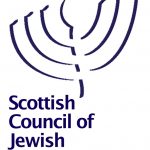 The Scottish Council of Jewish Communities (SCOJEC) and the Scottish Refugee Council brought an exciting contemporary dance performance to Scotland for Refugee Festival 2019 – and for the first time in Scotland also links contemporary with klezmer dance.
The Scottish Council of Jewish Communities (SCOJEC) and the Scottish Refugee Council brought an exciting contemporary dance performance to Scotland for Refugee Festival 2019 – and for the first time in Scotland also links contemporary with klezmer dance.
In 2015, at the height of the refugee crisis in Berlin, Israeli director and choreographer Nir de Volff, the founder of dance company “TOTAL BRUTAL”, recognised how dance could be used to help migrants deal with the emotional and physical stress they may have gone through during their harrowing trip to Germany. The training he developed at that time has led to this show, which is a collaboration with three Syrian refugee dancers.
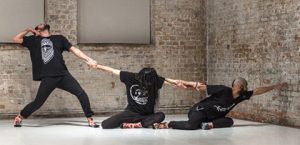 Come As You Are #Berlin premiered in Scotland on 27 June (Edinburgh) and 30 June (Glasgow), and explored what happens when the Syrian dancers, who are trained in ballet, musicals, and folk dance, arrive in the contemporary dance world of Berlin, with its radical exploration of freedom, the body, sexuality, and identity.
Come As You Are #Berlin premiered in Scotland on 27 June (Edinburgh) and 30 June (Glasgow), and explored what happens when the Syrian dancers, who are trained in ballet, musicals, and folk dance, arrive in the contemporary dance world of Berlin, with its radical exploration of freedom, the body, sexuality, and identity.
SCoJeC Project and Outreach Manager Fiona Frank who attended the performance’s premier in Weimar in 2018, commented:
“I was very moved when I saw the show. I felt it really brought the refugee experience to life in a new way that I had never considered before, and I resolved to bring the dancers to Scotland. SCoJeC proposed this collaboration to the Scottish Refugee Council, and I’m so pleased that they decided it was a good fit for the Refugee Festival, with its theme this year of “Making Art, Making Home”.
SCOJEC decided to involve the audience by following each performance with a klezmer ceilidh. This connection between contemporary dance and klezmer – the music and dancing of the Jews of Eastern Europe – is also a new venture. Scotland’s foremost klezmer bands, Edinburgh-based Kleyne Klezmer led by clarinet player Andrew Gardiner, and Celter Schmelter led by fiddle player Gica Loening, agreed to participate in this project.
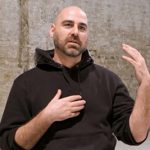 Nir de Volff, pictured left, is the Israeli director of Berlin-based dance company TOTAL BRUTAL, and the Syrian dancers come from the same part of the world – one of the most complicated and disputed regions on the planet.
Nir de Volff, pictured left, is the Israeli director of Berlin-based dance company TOTAL BRUTAL, and the Syrian dancers come from the same part of the world – one of the most complicated and disputed regions on the planet.
“Our countries are enemies, our politicians are poisoning us with fear against each other”, said Nir.
“I would never have met them if it wasn’t for the war – so from this bad situation we can at least make something good happen. I was volunteering at a refugee organisation, teaching dance to non-dancers. That’s where I met these three trained dancers who had worked in ballet and folk dance back in Syria. I could have turned my back on them and got on with my life but of course I didn’t. I started to work with them, helping them to see how a contemporary dance show is created, and showing them a new physical language of improvisation.
“We hear about Syrian refugees all the time, but we don’t know anything about the culture they bring from their homeland. Syria is not a desert; these dancers studied in the Higher Institute of Dramatic Arts in Damascus, and through the show we learn something about the culture they brought with them, as well as how they come to terms with cultural diversity for the first time in their lives, in one of the most popular cities in Europe.”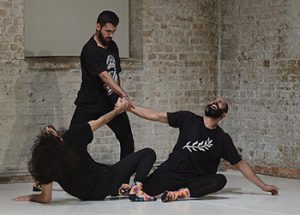
In the past few years, De Volff, director of Come As You Are #Berlin, has developed a unique method that focuses on how dance can create new social channels and build new communication skills between all kinds of people irrespective of age or body type.
During the week he led a dance session with a group of refugee families at the Scottish Refugee Council offices, and a workshop in Hillhead Primary School for 30 Primary 7 pupils. His workshops taught students the importance of diversity in the class, in the neighbourhood, and in society.
He also stresses the value of physical movement and dance as a way of bringing people together, in contrast to the increasing isolation in society caused by people only communicating online. The feedback from the school was very positive, with the children throwing themselves enthusiastically into the workshop activities.
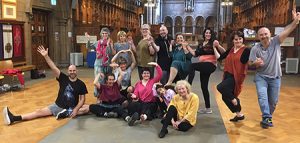 On the last day of Refugee Festival Scotland, De Volff ran a morning contemporary dance session at Glasgow University Chapel as part of a day-long dance workshop that also included Klezmer and Israeli dance, with live music from members of the Glasgow group Bunch of Klezmer, and the Israeli dance session was led by Glasgow-based dance teacher Shosh Greenberg.
On the last day of Refugee Festival Scotland, De Volff ran a morning contemporary dance session at Glasgow University Chapel as part of a day-long dance workshop that also included Klezmer and Israeli dance, with live music from members of the Glasgow group Bunch of Klezmer, and the Israeli dance session was led by Glasgow-based dance teacher Shosh Greenberg.
The idea of this day of dance was to bring together people from different backgrounds to have a go at some very different types of dancing, some of which would be new to them. As Gary Christie from Refugee Festival Scotland reminded us last week, the varied programme of events that make up Refugee Festival Scotland:
“strengthens connections between people from different backgrounds, and creates opportunities for people from different backgrounds to meet and get to know each other better”.
One participant who had travelled from Stirling to attend the workshop told us:
“I knew the Klezmer tradition so that was comfortable and enjoyable territory. Contemporary, Syrian, and Israeli dancing were very different, refreshing, thought provoking as well as just plain good fun.”
And other participants were equally enthusiastic:
“I had a really great time! I know it was a shame the Syrians couldn’t make it, but as it was, it was a really energizing and refreshing day with great company! I do hope it can be a regular fixture.”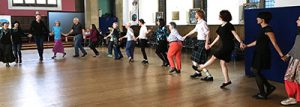
“Thank you for a lovely day. I especially enjoyed the Klezmer and Israeli workshops – they are really are my thing! The added bonus – two of the Israeli dances were amongst my favourites. Hope to dance with you again.”
“The workshop was amazing – bring it again please!”
